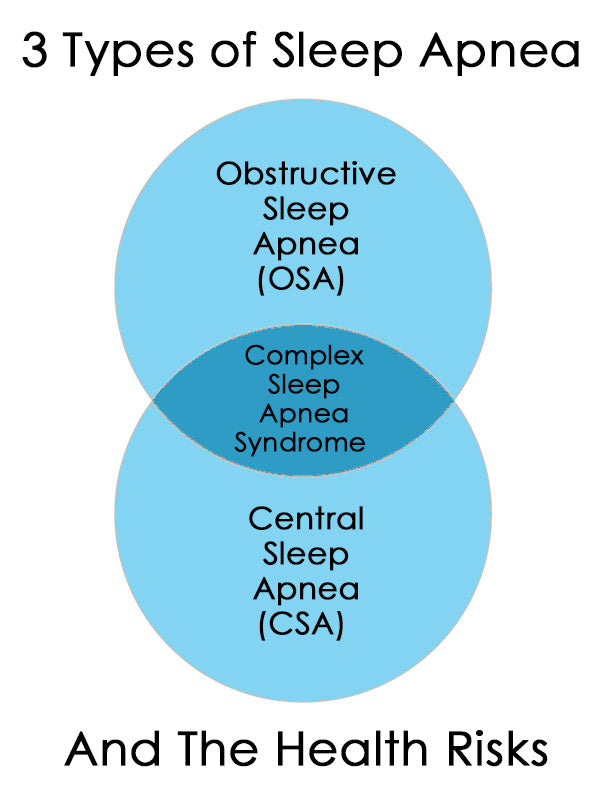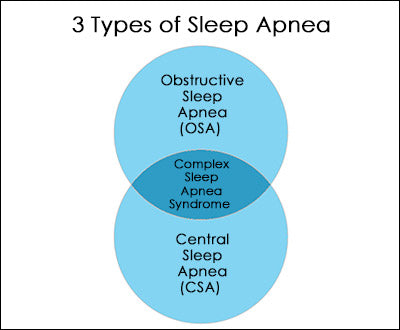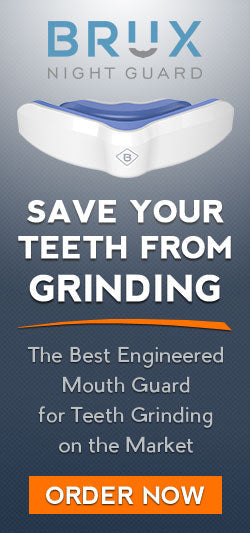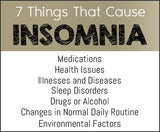Three Types of Sleep Apnea and the Health Risks
With all due respect to the author of the old adage "a lack of sleep never hurt anybody," a recent study, published in the journal Sleep Medicine, suggests just the opposite.
People who get less sleep, say researchers in the UK, are more likely to experience issues around chronic pain, and sleep apnea is one cause for the pain and sleep issues many people suffer from on a nightly basis.
"Sleep and pain problems are two of the biggest health problems in today's society," lead author of the study, Esther Afolalu, told Reuters News.
High on the list of disorders that make healthy slumber a near impossibility is sleep apnea, a condition that causes people to involuntarily stop breathing while asleep.

Types of Sleep Apnea
The pauses in breathing caused by sleep apnea can vary in length from a few seconds to a few minutes. Depending on the individual and the type of sleep apnea they’re living with, breathing can stop hundreds of times a night.
There are three main types of sleep apnea and the effects can vary between each type.
1. Obstructive Sleep Apnea (OSA)
Obstructive Sleep Apnea is the most common type and it occurs when the throat muscles in the back of the throat relax and the airway closes or becomes too narrow to allow a person to breathe normally. This decreases the amount of oxygen in the blood and brain.
2. Central Sleep Apnea (CSA)
Central Sleep Apnea is the effect of what happens when the brain doesn’t properly send signals to breathing muscles and a person essentially stops breathing for a short period of time. Central Sleep Apnea is less common than the Obstructive type.
3. Complex Sleep Apnea Syndrome
Complex Sleep Apnea Syndrome is sometimes referred to as “Treatment-emergent Central Sleep Apnea,” and it is generally a combination of both Obstructive Sleep Apnea and Central Sleep Apnea. It is the least common of all three types.
There are a number of fallacies around sleep apnea, most notably that a person has to be overweight or obese to have it and that it's strictly a health issue men develop.
While both of those are frequently true, there are many other reasons for a person to struggle with sleep apnea.
Sleep Apnea Risk Factors
According to the National Institutes of Health, this condition is not limited solely to the overweight demographic. Some of the other sleep apnea risk factors at play include the following:
- Sleep apnea can occur at any age, however, the risk of developing the disorder increases with age, especially in those over 40
- A family history of sleep apnea increases an individual's chances of suffering the same issues
- People who have small airways due to their physical anatomy or a separate condition, such as chronic allergies, often suffer with increased congestion and limited breathing capacity
- While overweight children might be at an increased risk of sleep apnea, smaller children with enlarged tonsils can struggle with it too
Health Risks From Poor Sleep
A consistent inability to get the right amount of restful, uninterrupted sleep caused by apnea and other sleep disorders increases health risks in other areas.
In her interview with Reuters Health, Dr. Afolalu noted disturbances in sleep add to the body's inability to manage pain. Poor sleep-health might also lead to some of the following negative side effects:
- An increased risk in having high blood pressure
- Greater likelihood of stroke and heart failure
- Diabetes is also linked to untreated sleep apnea
- Chronic fatigue and headaches
- Depression
- The National Heart, Lung, and Blood Institute lists a range of metabolic risks that disrupts the normal biochemical processes involved in healthy bodily functions
It's impossible to self-diagnose sleep apnea due the nature of its existence. People are, after all, asleep when it's happening, leaving a large number of people unaware that they have the condition.
Sleep Apnea can only be diagnosed in a sleep clinic or by being involved in a sleep study.
The Mayo Clinic reports that physicians might suggest lifestyle changes, such as losing weight or treating chronic allergies that cause congestion, for people with mild sleep apnea.
Continuous positive airway pressure, otherwise known as CPAP masks, can help keep airways open, and for serious conditions, surgery may be necessary.
For people who are simply problem snorers or are unsure if they have sleep apnea, oral aids are available on the market that may help reduce or stop snoring.
Don't assume that a regular lack of sleep, whether due to sleep apnea or other conditions won't come with negative health consequences.
Investigate ways to improve your overall count of solid zzzz's and the body will manage pain more effectively, which leads to greater overall health and wellbeing.






